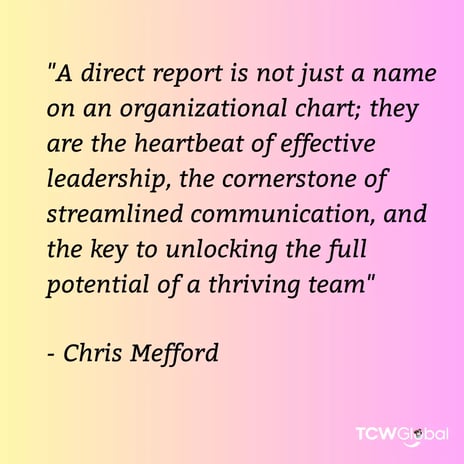What is a Direct Report?

August 2, 2023

So you've been asking, what is a direct report?
Definition and Strategies for Effective Management
As a leader, you are likely to have a group of workers known as direct reports who report directly to you. These individuals hold more significance than just being a category on the organizational chart. They play a crucial role in helping you grow your business and develop your leadership skills. Let’s explore what a direct report is, how it differs from an indirect report, and the benefits of having direct reports in your organization.
What Is a Direct Report?
A direct report is a worker or contributor who works under a specific manager and reports directly to them for feedback, questions, coaching, and other issues. In most cases, senior managers, supervisors, and executives work with direct reports. Managers themselves can be direct reports to higher-level managers, creating a chain of command within the organization.
Who Counts as a Direct Report?
Any worker who works directly under a manager can be considered a direct report. For example, an entry-level human resources worker may be a direct report to an HR supervisor, who, in turn, is a direct report to an HR manager. The HR manager may further be a direct report to the Vice President of HR.
Benefits of Having Direct Reports
Direct reports bring several benefits to your business, which can significantly impact its success.
-
Streamlined Work Process:
Direct reports allow you, as a leader, to delegate tasks and responsibilities, making the decision-making process smoother. They become a reliable point of contact for their team members, streamlining communication and fostering efficiency. -
Enhanced Communication:
Working with direct reports ensures consistent and clear communication channels. Team members know whom to approach for guidance, reducing confusion and unnecessary back-and-forth exchanges. -
Increased Worker Satisfaction:
Clearly defined roles and responsibilities give workers a sense of direction, leading to higher job satisfaction and engagement. -
Promotes Teamwork:
When responsibilities are well-defined, direct reports can collaborate effectively, leading to better team dynamics and productivity. -
Accurate Performance Reviews:
Developing one-on-one relationships with direct reports allows managers to better understand their progress and performance, leading to more meaningful performance reviews. -
Cost Efficiency:
Direct reports help in eliminating redundancies and inefficiencies that can arise when several workers feel responsible for the same task. -
Stronger Worker Relationships:
Regular interactions with direct reports enable managers to build trust, inspire loyalty, and foster greater worker engagement, which should lead to better productivity and higher revenues.

Direct Report vs. Indirect Report: Understanding the Difference
An indirect report refers to a team member who reports to one of your direct reports. While you, as a manager, are indirectly in charge of these individuals, their immediate supervisor is your direct report. Instructions and decisions given to your direct report are likely to impact your indirect reports as well.
Effectively Managing Your Direct Reports: 6 Tips
Managing direct reports can be a challenging task, requiring strong people skills and effective communication.
-
Offer Regular Positive Feedback:
Recognize and acknowledge your worker's efforts with positive feedback, as it can be a powerful motivator for better performance. -
Outline Goals and Responsibilities:
Clearly define your direct reports' goals and responsibilities to ensure they have a clear understanding of what is expected of them. -
Take an Interest in Your Direct Reports:
Build trust and rapport by engaging in regular conversations with your direct reports, and showing genuine interest in their lives and work. -
Solve Performance Issues Together:
Address performance issues promptly and collaboratively, allowing your direct reports to participate in finding solutions and building problem-solving skills. -
Develop a Career Roadmap:
Encourage career growth and development by discussing long-term career goals with your direct reports and providing necessary support and opportunities.
Help Your Direct Reports Find Success
As a skilled manager, effectively managing multiple direct reports involves emphasizing people skills rather than excessive supervision. Building trust and fostering emotional connections through positive feedback and everyday interactions can lead to improved performance and drive your organization to new heights.
By creating a culture of clear communication and accountability, you can establish a robust system for direct reporting that supports your business's growth and success.
Next Steps
TCWGlobal, as an employer of record and payrolling service provider, offers invaluable support to businesses by freeing up time for managers to concentrate on their core business responsibilities and direct reports.
By handling essential HR tasks such as payroll management, worker benefits, tax compliance, and legal paperwork, TCWGlobal allows managers to offload administrative burdens.
This enables them to dedicate more time and attention to guiding their teams, fostering stronger worker relationships, and driving business growth.
With TCWGlobal managing the intricacies of employment administration, managers can confidently focus on strategic decision-making and creating a conducive work environment for their direct reports, ultimately leading to a more engaged workforce.
